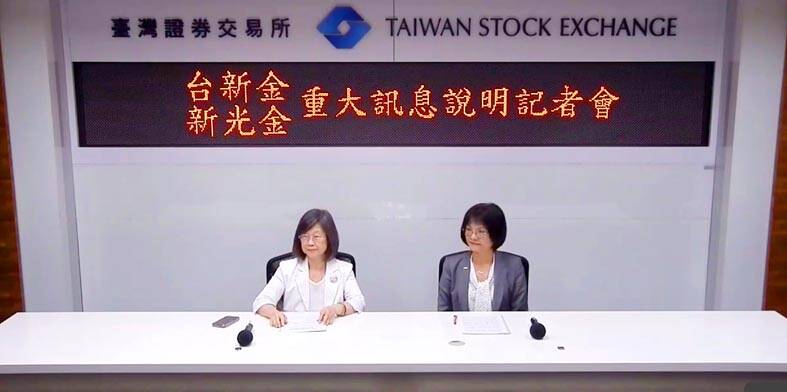Taishin Financial Holding Co (台新金控) yesterday secured a merger agreement with Shin Kong Financial Holding Co (新光金控) via share swaps, despite lingering uncertainty over a hostile takeover bid by CTBC Financial Holding Co (中信金控) on the open market.
Bank-focused Taishin Financial and life insurance-focused Shin Kong Financial announced the agreement, although it still needs Financial Supervisory Commission (FSC) approval and a green light at their respective shareholders’ meetings, while CTBC could press ahead with the buyout attempt.
“The consolidation would be carried out fully via share swaps and would benefit both Taishin and Shin Kong,” Taishin Financial chief financial officer Carol Lai (賴昭吟) said at a news conference at the Taiwan Stock Exchange in Taipei last night.

Photo: Wu Hsin-tien, Taipei Times
Taishin Financial plans to issue new ordinary shares for Shin Kong Financial shares, with a share swap ratio of 0.6022 Taishin Financial common shares for one Shin Kong Financial common share, while one Taishin Financial preferred share for each Shin Kong Financial preferred share, Lai said.
The companies would put the proposal to their shareholders on Oct. 9 and then set a date for the merger after receiving regulatory approval, she said.
The two conglomerates have little overlapping businesses and the merger would make the combined entity Taiwan’s fourth-largest financial service provider based on assets, Lai said.
After the merger, Shin Kong Financial will become part of Taishin Financial, though the new entity will be renamed Taishin-Shin Kong Financial Holding Co (台新新光金控).
Shin Kong Financial, a laggard among its peers in terms of profitability, has expressed interest in merging with other conglomerates, and Taishin Financial was believed to be the most likely buyer, given that its chairman, Thomas Wu (吳東亮), is the younger brother of former Shin Kong Financial chairman Eugene Wu (吳東進).
Taishin Financial has pledged to retain all Shin Kong employees after the merger, which it said would bolster their mutual banking, life insurance and securities businesses.
CTBC Financial, which has deeper pockets, on Tuesday said that it aims to grow into a large international player as it plans to launch a tender offer to acquire Shin Kong Financial on the open market.
The company would become Taiwan’s largest financial service provider if it were to acquire Shin Kong Financial, it said.
The FSC has sought to stay neutral by repeating that all acquisition deals must be conducted in compliance with legal requirements without harming market order or stability, and do not compromise the interests and rights of shareholders.

UNCERTAINTY: Innolux activated a stringent supply chain management mechanism, as it did during the COVID-19 pandemic, to ensure optimal inventory levels for customers Flat-panel display makers AUO Corp (友達) and Innolux Corp (群創) yesterday said that about 12 to 20 percent of their display business is at risk of potential US tariffs and that they would relocate production or shipment destinations to mitigate the levies’ effects. US tariffs would have a direct impact of US$200 million on AUO’s revenue, company chairman Paul Peng (彭雙浪) told reporters on the sidelines of the Touch Taiwan trade show in Taipei yesterday. That would make up about 12 percent of the company’s overall revenue. To cope with the tariff uncertainty, AUO plans to allocate its production to manufacturing facilities in

TAKING STOCK: A Taiwanese cookware firm in Vietnam urged customers to assess inventory or place orders early so shipments can reach the US while tariffs are paused Taiwanese businesses in Vietnam are exploring alternatives after the White House imposed a 46 percent import duty on Vietnamese goods, following US President Donald Trump’s announcement of “reciprocal” tariffs on the US’ trading partners. Lo Shih-liang (羅世良), chairman of Brico Industry Co (裕茂工業), a Taiwanese company that manufactures cast iron cookware and stove components in Vietnam, said that more than 40 percent of his business was tied to the US market, describing the constant US policy shifts as an emotional roller coaster. “I work during the day and stay up all night watching the news. I’ve been following US news until 3am

COLLABORATION: Given Taiwan’s key position in global supply chains, the US firm is discussing strategies with local partners and clients to deal with global uncertainties Advanced Micro Devices Inc (AMD) yesterday said it is meeting with local ecosystem partners, including Taiwan Semiconductor Manufacturing Co (TSMC, 台積電), to discuss strategies, including long-term manufacturing, to navigate uncertainties such as US tariffs, as Taiwan occupies an important position in global supply chains. AMD chief executive officer Lisa Su (蘇姿丰) told reporters that Taiwan is an important part of the chip designer’s ecosystem and she is discussing with partners and customers in Taiwan to forge strong collaborations on different areas during this critical period. AMD has just become the first artificial-intelligence (AI) server chip customer of TSMC to utilize its advanced

Six years ago, LVMH’s billionaire CEO Bernard Arnault and US President Donald Trump cut the blue ribbon on a factory in rural Texas that would make designer handbags for Louis Vuitton, one of the world’s best-known luxury brands. However, since the high-profile opening, the factory has faced a host of problems limiting production, 11 former Louis Vuitton employees said. The site has consistently ranked among the worst-performing for Louis Vuitton globally, “significantly” underperforming other facilities, said three former Louis Vuitton workers and a senior industry source, who cited internal rankings shared with staff. The plant’s problems — which have not